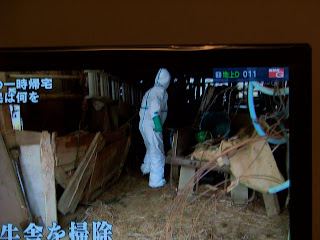
It's lovely spring weather (though the rainy season looms). The azaleas and the wisteria are in bloom. Rather than playing Cops and Robbers, I suggested to Koharu that we take the three girls on a walk. Koharu looked a bit hesitant.
"I'd love to go on a walk, but. . ." she cocked her head slightly, as if pondering some difficult puzzle.
"It's okay," I said hastily, "Let's play another round of Cops and Robbers instead."
It seemed likely to me that Koharu's mother had instructed her not to leave the area immediately by the Center. Of course, that makes sense. The valley is hardly a safe place for little girls to play. It's occupied by the army and the police; it's occupied by trucks installing new electric poles (I heard that several electricians have died trying to hook up the mass of tangled wires and fallen poles). Not only that, but were we to go on a walk, what would be our destination? Certainly not the lower part of the village, which is a desert of rubble. Fortunately, one can't see the lower town from the Center, so the girls can run around and even pretend things are normal. Obviously, I should not take them down the hill to see a scene that could only bring back bad memories. I can't really ask them what those memories are, so I must tread carefully. I must interact with Koharu in a small, limited mental space, like the small yard of the Center. Within this space things are relatively normal and calm, and it is my responsibility not to invite her out of it.
But there's precious little to do in the Center yard-- hence Cops and Robbers, yet again!





























